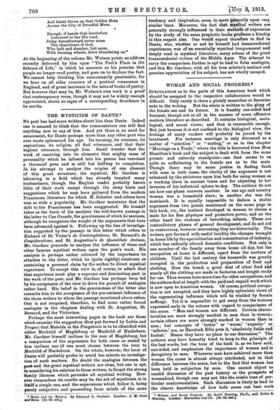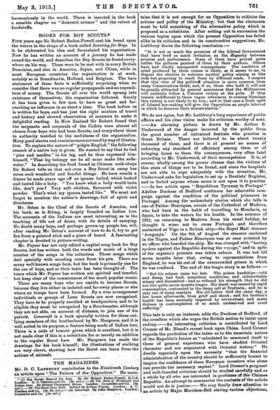WOMAN AND SOCIAL PROGRESS.*
SPECULATION as to the parts of this American book which should be assigned to the respective collaborators would be difficult. Only rarely is there a plainly masculine or feminine note in the writing. But the whole is written to the glory of the female sex and its future. It is frankly one-sided-and feminist, though not at all in the manner of some offensive modern literature so described. It contains biological, socio- logical, and moral views ; and that is reasonable enough. But just because it is not confined to the ,biological view, the feelings of many readers will probably be jarred by the treatment. For instance, marriage is only discussed as a matter of " selection " or " mating," or as in the chapter "Marriage as a Trade," where the title is borrowed from Miss Hamilton's book and the subject is dealt with from the same prosaic and unlovely standpoint—one that seems to us quite as unflattering to the female sex as to the male. Though there may be some justice in finding fault with man in both cases, the clarity of the argument is not enhanced by the strictures upon him both for using woman as a working slave in ancient times and for objecting to her invasion of his industrial sphere to-day. The authors do not see how one phase answers another. In one age and country woman was a household slave; in another she was the matriarch. It is equally impossible to deduce a stable argument from two points mentioned on the same page in this book, viz., the instinct developed in woman to choose a mate for his fine physique and protective power, and on the other hand the customs of betrothing infants. These are contradictory phases of general development, and do not aid in controversy, however interesting they are historically. The writers put forward with useful lucidity the changes wrought in home life by the specialization and concentration of industry, which has radically altered domestic conditions. Not only is one member of the family away from home all day, but the occupation at home is different, apart from the nurture of children. Until the last century the housewife was greatly occupied in the production and preparation of food and clothing. Now the bread, a great deal of other food and nearly all the clothing are made in factories and bought ready for use. Thus women have more time for other occupations, and the authors deal at length with the paid and unpaid work which is now open to American women. Of course, political occupa- tion is not excepted, and they have highly optimistic views of the regenerating influence which will be wielded by female suffrage. Yet it is impossible to get away from the truisms expressed early in the volume with regard to comparisons of the sexes. "Men and women are different. Certain charac- teristics are more strongly marked in men than in women ; certain others are more strongly marked in women t4an in men ; but concepts of ' better' or worse," superior ' or inferior,' are, as Havelock Ellis puts it, absolutely futile and foolish.' Hence they have no place in our discussion." The authors may have honestly tried to keep to the principle of the last words, but the tone of the book is, as we have said, one-sided, and emphasizes the importance of women and is derogatory to men. Wherever men have achieved more than women the cause is almost always attributed, not to that difference between the sexes, but to the fact that woman Las been held in subjection by man. One cannot object to candid discussion of the past history or the prospects of womankind, though one may not like the eristio tone of par- ticular controversialists. Such discussion is likely to lead to the clearer knowledge of how both sexes can best- work • Mimeo and Social Progreis. By Scott Nearing, Ph.D., sail Nellie B. Nearing. London Macmillan and Co. De. 6d. mt.]
harmoniously in the world. There is inserted in the book a sensible chapter on "domestic science" and the values of foodstuffs.



















































 Previous page
Previous page